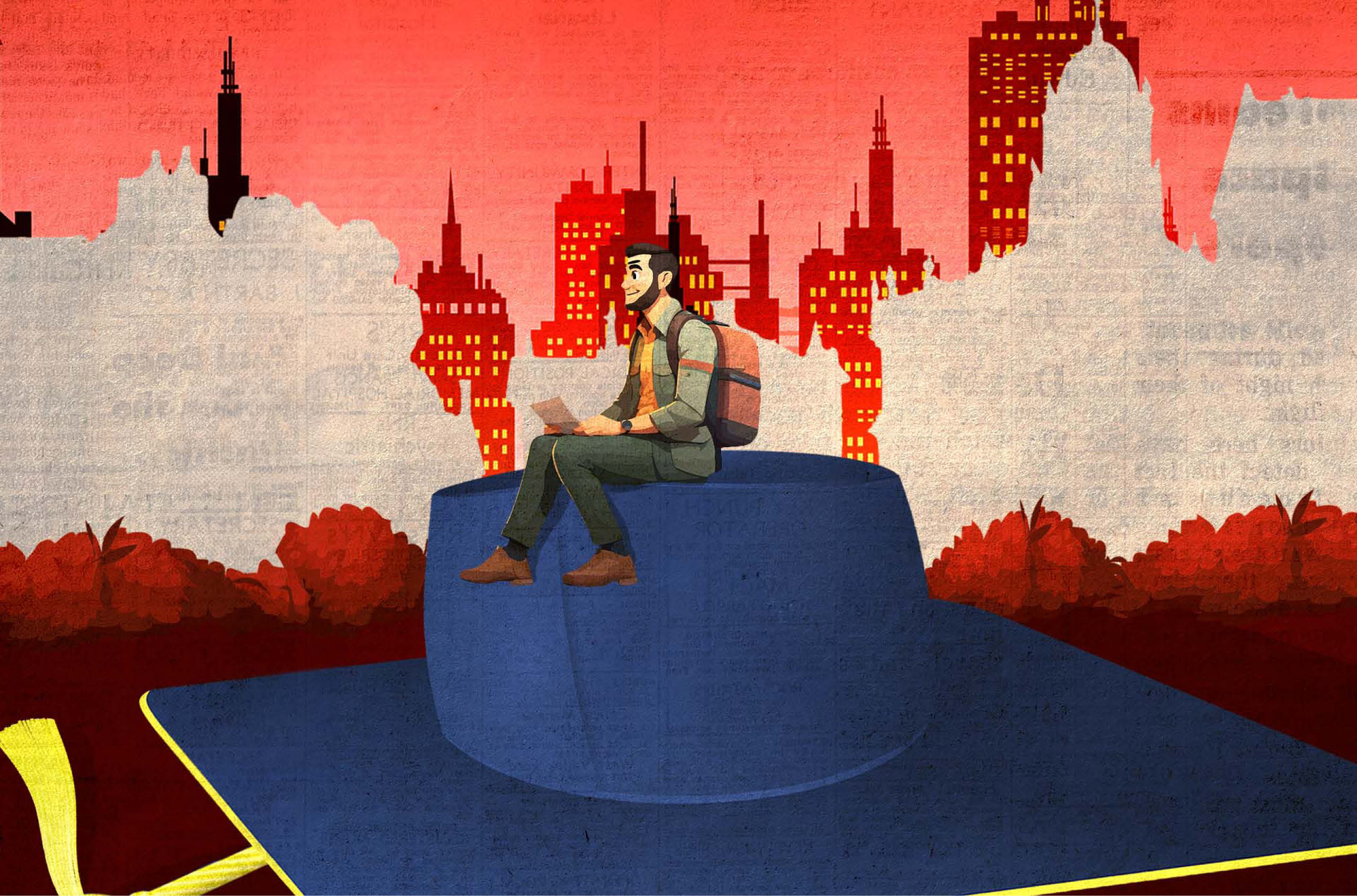An American in the Promised Land (of Canada!)
International PhD candidates are flocking to Canada because the country is seen as still valuing the humanities.

Unlike most Americans, I spent November 8, 2016 watching the televised results of the U.S. presidential election from the cozy vantage of a Canadian pub in downtown Toronto. At the time, I remember thinking how, for all of the ways that night defied precedence, in two ways it felt familiar. First, and if social media were to be believed, a “mass exodus” of disaffected Americans into Canada threatened to follow the election. With echoes of the Vietnam War, this episode served as the latest reminder of how every time Americans are beset by moral crisis we tend to look north for moral asylum, where cooler climes and heads prevail. Fortunately, no such exodus occurred; though, that did little to temper the media’s biblical bombast. Writing for Maclean’s after the inauguration, Scott Gilmore pontificated, “by virtually every measure, Canada has surpassed the United States as the shining city on the hill” (my emphasis). Here struck the second familiar chord, for I had heard such language used before; though, oddly enough, in the halcyon days of 2012, when I was first deciding where to pursue a doctorate.
“The Promised Land” was how my then-supervisor at the University of Colorado described Canada to me. It was hard for me to imagine then. Sitting in his office between familiar stacks of old anthologies, journals and student papers, we were discussing the weighty topic of “the future” – my future, specifically – and my plans for it. Since my literary foray into the early 19th century, the world of the Romantics, I knew that I would continue my studies through a PhD in English. I had the grades, grit and gumption to undertake a doctorate, and so the only question remaining was where to do it. My list of prospects included some of the most recognizable names in American higher education. Yet, when my supervisor reviewed my list, he shook his head and stated plainly, “you should really be considering the University of Toronto.” I balked. Why, of all places, Canada?
His response, I came to learn, was borne out both by data and my own experience. “Canada,” he replied, “is the promised land for anyone thinking about studying in the humanities” because neither their institutions nor their public have yet lost sight of the value afforded to society by those disciplines, and so there is still robust support for them. Even in 2012, the implicit contrast between the U.S., whose fading support for the arts and humanities seemed to reflect a declining humanity in public life, and Canada, whose healthier civic society appeared to be underwritten by unflagging support for these fields, felt like a compelling reason to consider the latter a Promised Land. Five years later, three things seem worth mentioning in light of the relevant data, my own experience, and the current political climate that will hopefully inspire Canadian universities to act on a profound opportunity.
As the Washington Post recently reported, Canadian universities are experiencing a surge of interest from American graduates and undergraduates alike. In view of this, it is worth noting the relevant data generated by U of T’s 10,000 PhDs Project. In particular, the data on American students in Canada underscore the need to take seriously the perception of Canada as a “promised land” for the humanities and social sciences, for it will likely continue to drive applicant trends as students from the States increasingly face shrinking departments, diminished funding, rising costs and gutted programs.
The 10,000 PhDs Project has shown that while 15 percent of all PhD graduates from U of T were in humanities, this percent increases dramatically to 50 percent for American PhD graduates, suggesting that my supervisor’s characterization of Canada as a “promised land” for these fields is widespread.
My own experience also shows where universities, provincial and federal governments can develop a comprehensive strategy for capitalizing on American interests in Canadian higher education. Of course, my experience has been atypical, and others who came north to study I know have had different experiences. I have been lucky in benefiting from several sources of support since 2013, including the Jackman Humanities Institute. Then, from 2015 to 2017, thanks to my supervisor’s SSHRC Insight Grant, I conducted research and presented my work in the U.K. and India, which enhanced the range and quality of my dissertation.
However, it has seemed like a missed opportunity that American students were largely barred from applying for many awards. There are obvious reasons for this. But, equally obvious are the reasons for including Americans in applying for fellowships, grants and other awards, and for improving their overall experience so that more might follow. To be sure, U of T’s recent push to reduce international graduate student fees is a commendable start. But universities might go further, for instance, by introducing a separate pool of awards for Americans to pursue in competition with each other. Or, they might enlist individual departments in sponsoring permanent residency applications. At the very least, Canadian institutions should consider how the 10,000 PhDs Project might serve to draw some of the best and brightest from its southern neighbour.
Finally, if Canada seeks to solidify its status as a “shining city on the hill” by attracting more American students in the humanities and social sciences, it might look to one of its own legendary thinkers to make the case. Toronto, after all, was home to Northrop Frye, whose work on William Blake and his seminal epic, Jerusalem, served to remind us of the parallels between the Romantic period and our own, and of the importance of the arts in combatting extremism of all stripes and times. As Frye wrote so presciently (and as I paraphrase so shamelessly) in the preface to Fearful Symmetry:
Today, now that reactionary and radial forces alike are once more in the grip of the nihilistic psychosis that Blake described so powerfully in Jerusalem, one of the most hopeful signs is the immensely increased sense of the urgency and immediacy of what Blake had [and, moreover, what the humanities have] to say.
Half a century hence, no doubt Frye would have recognized in present-day Toronto, and in Canada, an aspect of Blake’s visionary emanation in Jerusalem – for all its technological and pluralistic promise as a city and country of the 21st century, and for its institutional commitment to humanistic inquiry for which many Americans have embarked on a northward exodus to the Promised Land to pursue. Canada should welcome them.
Christopher Kelleher is a PhD candidate and the Chancellor Jackman Junior Fellow in the department of English at the University of Toronto.
Featured Jobs
- Psychology - Assistant Professor (Speech-Language Pathology)University of Victoria
- Education - (2) Assistant or Associate Professors, Teaching Scholars (Educational Leadership)Western University
- Canada Excellence Research Chair in Computational Social Science, AI, and Democracy (Associate or Full Professor)McGill University
- Business – Lecturer or Assistant Professor, 2-year term (Strategic Management) McMaster University
- Veterinary Medicine - Faculty Position (Large Animal Internal Medicine) University of Saskatchewan















Post a comment
University Affairs moderates all comments according to the following guidelines. If approved, comments generally appear within one business day. We may republish particularly insightful remarks in our print edition or elsewhere.
4 Comments
The author’s impressive list of Canadian scholars of the humanities:
Northrop Frye …
…
and then again, there’s Northrop Frye …
Did I mention Northrop Frye?
might be improved by the addition of the man many are calling, today, Canada’s leading intellectual figure, namely the professor of Clinical Psychology at the same University of Toronto, Dr. Jordan Peterson.
Who, by the way, would (and certainly has already in many of his public lectures) disagree almost to the letter with Mr Kelleher’s assessment of the state of the humanities in Canada
Wait till you try to find a job. You’ll find out how much Canadian universities value the humanities.
Signed –
One half of a Canadian academic couple, both with multiple grad degrees, the other half with multiple SSHRC and OGS support and a PhD in English from U Toronto. Both of us got work in the US, after 3 years of trying to stay home. We have now been gone 13 years, and won’t be back.
I am an American citizen, married to a Canadian. We live in Quebec since 45 years where we raised our 2 children who were educated in Montreal, Toronto and Ireland. I am happy to give 50% of my salary on taxes (I still have to pay IRS in the USA) to enjoy access to social peace, quality education and health care.
I read your text with scepticism.
Both my children could not afford studying in the USA, mainly due declining social climate and unaffordable tuition and cost of living. When my daughter, a Canadian citizen, attended University of Toronto, we had to pay full fees. I find it most unfair that it should be different for American students. When my son went to Ireland for his master degree, we also had to pay full fees and afford the high cost of European living.
Americans studying in Canada are already privileged by the dollar exchange rate; thus, tuition is cheaper for them, and so is the cost of living. Hence, they ought to pay the full price to pursue their education in this «Promise Land» that they have not helped built.
The «healthier civic society » you have lauded is the outcome of taxpayers’ money that supports policies to help the process of building a healthy society. The « exodus to the Promised Land» you are proposing should not be done at the expense of Canadian tax payers.
@Dr. Saôde Savary, Chemist Ph.D Public Health,
So you suggest American students pay a higher international student rate because their dollar is worth more? Isn’t this simply advocating a punitive measure on the basis of their country-of-origin? Either raise the international student tuition fees for all or none.